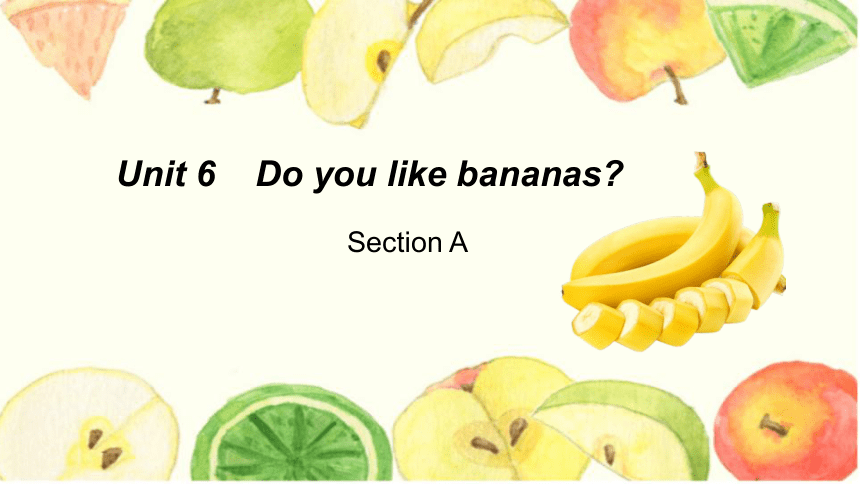(
课件网) Unit 6 Do you like bananas Section A food (1)意思是食物,是集合名词,作不可数名词(Uncountable noun), eg: I like Chinese food and culture(文化). (2)表示特定种类食物时,可以作为可数名词,此时 复数形式是foods 。 eg:Rice and chicken are good foods. apples oranges bananas fruit Do you know more fruit What’s in the fridge apple banana orange strawberry pear pears strawberries 1 fruit (1)意思是水果,是集合名词,作不可数名词(Uncountable nouns), eg: He doesn’t like eating fruit. (2)表示种类时,可以作为可数名词,此时 a fruit 指一种水果,fruits 指多种水果。 eg:The potato is a vegetable,not a fruit. 土豆是一种蔬菜,不是一种水果 tomatoes a tomato Guess carrots a carrot Guess vegetables eggs an egg Guess a hamburger hamburgers Guess bread bread a piece of bread 一片面包 three pieces of bread 三片面包 This _____(be) a piece of bread. These _____(be) two _____(piece) of bread. Here _____(be) some bread. is is are pieces rice a chicken two chickens 小鸡 chicken 鸡肉 pork 猪肉 beef 牛肉 mutton 羊肉 ice-cream Guess ice-cream salad Guess salad milk milk a bottle of milk 一瓶牛奶 a box of milk 一盒牛奶 a cup of milk 一杯牛奶 water coffee tea 1. hamburgers ____ 2. tomatoes ____ 3. oranges ____ 4. ice-cream ____ 5. salad ____ 6. bananas ____ 7. strawberries ____ 8. pears ____ 9. milk ____ 10. bread ____ d i f h b g c j e a Match the words with the things in the picture. 1a 1b Listen and number the conversations [1-3]. A: Do you like salad B: No, I don’t. A: Do you like bananas B: Yes, I do. A: Do you like oranges B: Yes, I do. 2 1 3 Listen and circle the food you hear. 2a hamburgers pears tomatoes strawberries oranges ice-cream salad bananas Listen again. Fill in the blanks. hamburgers tomatoes tomatoes ice-cream ice-cream 2b 小结:主语不是第三人称单数时,谓语动词用动词原形(like), 疑问句和否定句中用助动词do。主语是第三人称单数时,谓语动词词尾加-s/-es (likes), 疑问句和否定句中用助动词does。 疑问句和否定句中用到does后,谓语动词用原形(like). 1. I like fruit, but I (don’t / doesn’t) like vegetables. 2. She (like / likes) bread, but she (doesn’t / don’t) like salad. 3. He (like / likes) bananas, but he (don’t / doesn’t) like oranges. 3a Underline the correct words in the brackets. 第三人称单数形式 2d Read the conversation and circle the food in it. 2d Answer the questions below When(什么时候) is John’s birthday dinner A.Tomorrow(明天)B.Next week(下周). 2. What food does John like Hamburgers, salad, strawberries and apples. 3. Does Jack like salad No, he doesn’t. 1 / 2 / 3 下周 思考;思索 说的对 那么;然后 dinner 指“正餐”(中午或晚上吃)。 在西方,晚餐一般是一天中最为丰富的一餐,因此dinner 常用来指晚餐。 早餐 breakfast 中餐 lunch 晚餐 supper(不如dinner正式) have 这里是“吃”的意思。 eg: We have some bread. 我们吃了一些面包。 She has two bananas for lunch. 她午饭吃了两个香蕉。 一般现在时 概念:表示经常性的事情或者经常性的动作,或一般的事实。 eg:Lily has three volleyballs.(have) He goes to schoo ... ...

